A sports video game is a video game that simulates the practice of sports. Most sports have been recreated with video games, including team sports, track and field, extreme sports, and combat sports. Some games emphasize playing the sport, whilst others emphasize strategy and sport management. Some, such as Need for Speed, Arch Rivals and Punch-Out!!, satirize the sport for comic effect. This genre has been popular throughout the history of video games and is competitive, just like real-world sports. A number of game series feature the names and characteristics of real teams and players, and are updated annually to reflect real-world changes. The sports genre is one of the oldest genres in gaming history.
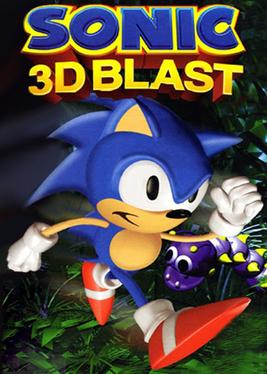
Sonic 3D Blast, known in Europe and Japan as Sonic 3D: Flickies' Island, is a 1996 platform game in the Sonic the Hedgehog series for the Sega Genesis and Sega Saturn. As Sonic the Hedgehog, the player embarks on a journey to save the Flickies, birds enslaved by Doctor Robotnik. The player must guide Sonic through a series of themed levels to collect Flickies and defeat Robotnik. Though it retains game mechanics from prior Sonic games, Sonic 3D Blast is differentiated by its 2D isometric perspective, with pre-rendered 3D models converted into sprites.

Dr. Robotnik's Mean Bean Machine is a falling block puzzle game developed by Compile and published by Sega. It was released for the Sega Genesis / Mega Drive in North America and Europe in November 1993, and ported to the Game Gear in 1993 and Master System in 1994.

Olympic Summer Games is an official video game of the Atlanta 1996 Olympic Games. It is the successor to Olympic Gold and Winter Olympics. It was the last "Olympic" video game released for the fourth generation of consoles, as well as the Game Boy.

Ace of Aces is a combat flight simulation game developed by Artech Digital Entertainment and published in 1986 by Accolade in North America and U.S. Gold in Europe. It was released for the Amstrad CPC, Atari 8-bit computers, Atari 7800, Commodore 64, MSX, MS-DOS, Master System, and ZX Spectrum. Set in World War II, the player flies a RAF Mosquito long range fighter-bomber equipped with rockets, bombs and a cannon. Missions include destroying German fighter planes, bombers, V-1 flying bombs, U-boats, and trains. In 1988, Atari Corporation released a version on cartridge for Atari 8-bit computers styled for the then-new Atari XEGS.

Sonic the Hedgehog 2 is a 1992 platform game developed by Aspect and published by Sega for the Master System and Game Gear. It is the sequel to the 8-bit Sonic the Hedgehog (1991) and follows Sonic as he attempts to get the Chaos Emeralds back to rescue his friend Miles "Tails" Prower from Dr. Robotnik. Like the first Sonic the Hedgehog, players run through levels at high speeds while collecting rings and defeating enemies. Although it shares the same title with Sonic the Hedgehog 2 for the Sega Genesis and their releases coincided, the games have little in common and share no levels.

PGA Tour Golf is a golf video game and the first in the PGA Tour game series. It was developed by Sterling Silver Software and released in 1990, for MS-DOS. It was initially published by Electronic Arts, which subsequently released versions of the game for Sega Genesis and Amiga in 1991, followed by a version for the SNES in 1992. By 1994, Tengen had published versions for Sega's Master System and Game Gear consoles. PGA Tour Golf received generally positive reviews for its realism, sound, and camera. Several critics considered the computer versions to be the best golf game available at the time of its release. It was followed by PGA Tour Golf II.

Teenage Mutant Ninja Turtles: Tournament Fighters, or Teenage Mutant Hero Turtles: Tournament Fighters in Europe, is the title of three different fighting games based on the Teenage Mutant Ninja Turtles, produced by Konami for the Nintendo Entertainment System, Sega Genesis, and Super NES and released during a period between 1993 and 1994. Konami produced a different fighting game based on the franchise each featuring a differing cast of characters for the platforms. All three versions of the game were re-released as part of Teenage Mutant Ninja Turtles: The Cowabunga Collection in 2022. with online play using rollback netcode for the SNES version of the game.

Ayrton Senna's Super Monaco GP II is an arcade-style Formula One racing video game developed and manufactured by Sega for the Sega Genesis and Mega Drive, Master System, and the Game Gear in 1992. It is a follow-up to Super Monaco GP. The game was also endorsed by, and had technical input from, the then-Formula One champion Ayrton Senna. Gameplay includes a World Championship season featuring recreations of the tracks in the 1991 Formula One World Championship, along with a three-race "Senna GP" mode set on fictional tracks.

Disney's Ariel the Little Mermaid, usually shorted to simply Ariel the Little Mermaid, is a 1992 video game developed by BlueSky Software for the Sega Genesis, Game Gear and Master System, based on the 1989 film The Little Mermaid.
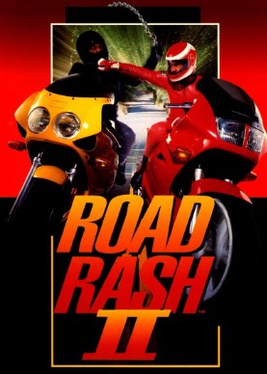
Road Rash II is a 1992 racing and vehicular combat game developed and published by Electronic Arts (EA) for the Sega Genesis. The game is centered around a series of motorcycle races throughout the United States that the player must win to advance to higher-difficulty races, while engaging in unarmed and armed combat to hinder the other racers. It is the second installment in the Road Rash series and introduces a split-screen two-player mode for competing human players, nitrous oxide charges on certain bikes, and chains as offensive weapons.

Mario & Sonic at the Olympic Winter Games is a 2009 sports and party game developed by Sega. Like its predecessor, it was published by Nintendo for Japan and Korea and by Sega in the Western world. The game is officially licensed by the International Olympic Committee (IOC) through exclusive license International Sports Multimedia. The game is the third official crossover title to feature characters from both Mario and Sonic's respective universes, the first and second being the game's predecessor Mario & Sonic at the Olympic Games and Super Smash Bros. Brawl respectively. It was released on the Wii and the Nintendo DS in October 2009, and is the first official video game of the 2010 Winter Olympic Games.
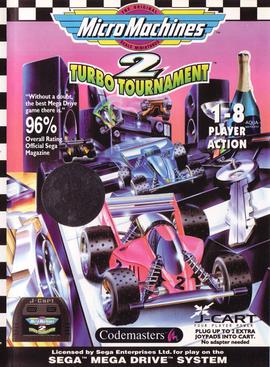
Micro Machines 2: Turbo Tournament is a 1994 racing video game developed by Supersonic Software and published by Codemasters for the Sega Mega Drive. The sequel to Micro Machines, the game is themed around Galoob's Micro Machines toys, and players race around environments in miniature toy vehicles. Micro Machines 2: Turbo Tournament adds new vehicles and game modes, and the Mega Drive version was released on J-Cart, enabling up to eight players without a multitap.
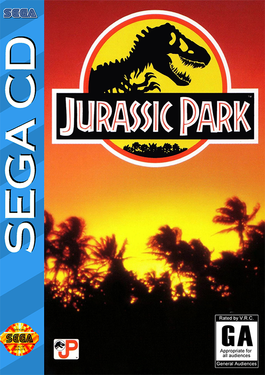
Jurassic Park is a 1994 point-and-click adventure game developed and published by Sega for the Sega CD. The video game is based on the 1993 film of the same name, and includes elements from Michael Crichton's 1990 novel Jurassic Park, which the film is based upon.

Micro Machines is a racing game developed by Codemasters and originally published by Camerica for the Nintendo Entertainment System in 1991. Themed around Galoob's Micro Machines toys, players race in miniaturised toy vehicles around various environments. The game is the first installment in the Micro Machines video game series.

Jack Nicklaus Golf & Course Design: Signature Edition is a 1992 golf video game developed by Sculptured Software and published by Accolade for MS-DOS. It is part of a series of games named after golfer Jack Nicklaus, and follows Jack Nicklaus' Unlimited Golf & Course Design (1990). Like its predecessor, the game includes a golf course designer that allows the player to create customized courses. Two add-on disks provide additional courses. In 1995, both disks were re-released along with Signature Edition as a compilation titled Jack Nicklaus: The Tour Collection.

Links: The Challenge of Golf is a golf video game developed by Access Software. It was published for MS-DOS in 1990, followed by the Amiga in 1992. A Sega CD version, developed by Papyrus Design Group, was released in 1994. It is the first game in the Links series, and was followed by Links 386 Pro (1992). A Microsoft Windows version, titled Microsoft Golf, was released in 1992 as the first game in the Microsoft Golf series.
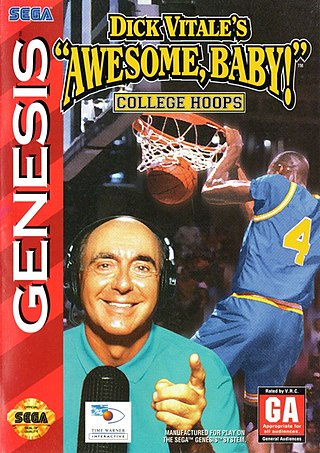
Dick Vitale's "Awesome, Baby!" College Hoops is a 1994 college basketball sports game developed and published by Time Warner Interactive. It was released for the Sega Genesis in 1994. Directed by Richard Seaborne, the game features the voice and likeness of the basketball sportscaster Dick Vitale and prominently features his quotes and catchphrases. Players play as multiple college basketball teams from the United States in a 3D court that automatically rotates to fit to the player's position, which was a major selling point for the game.

The Terminator is a 1992 video game published for several Sega consoles, including the Sega Genesis, the Master System, and the portable Game Gear. It is based on the 1984 film of the same name. The game was developed by Probe Software and published by Virgin Games. The Terminator was praised for its graphics and sound, but criticized for its gameplay.

Pelé! is a 1993 sports video game developed by Radical Entertainment and published by Accolade for the Sega Genesis. The game is based on the sport of association football and puts the player in control of a football team in modes of play such as exhibitions, tournaments, and seasons. It is named after and endorsed by former Brazilian footballer Pelé, who also provided input on the game's design.




















